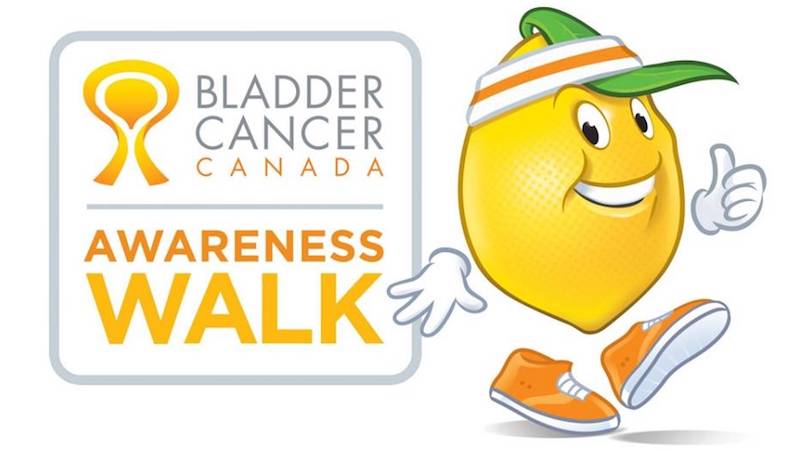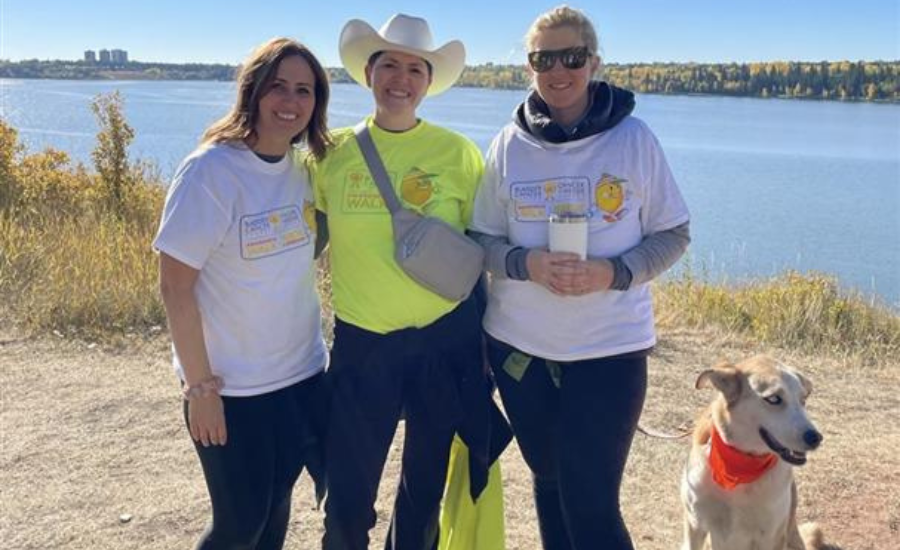May is Bladder Cancer Awareness Month, something that hits very close to home for me. As a bladder cancer survivor, spreading awareness about this all too common, yet surprisingly unknown disease has become a passion project for me.
Many people have never heard of bladder cancer or, if they have, do not realize how common this type of cancer is.
What you should know about bladder cancer:
- Bladder cancer is the 5th most common type of cancer in Canada
- It’s the 4th most common for men
- And the 12th most common among women
- Bladder cancer is the most expensive cancer to treat, as it has a 60-70% recurrence rate, one of the highest of all cancers
- This year alone, approx. 12,000 new cases will be diagnosed throughout the country, yet very few people know what signs and symptoms to watch for and when to see their doctor
As a volunteer for Bladder Cancer Canada and a co-chair for the annual Bladder Cancer Awareness Walk in Calgary, I hope by sharing my story I can help others with early detection and provide resources to those already fighting this disease.
Bladder Cancer Diagnosis
I was in my final year of studies in the Exercise and Wellness program at Arizona State University when I was diagnosed. The diagnosis came as a shock to everyone, including my doctors, as I did not fit the profile of a typical bladder cancer patient. Bladder cancer is most common in people over 60, more common in men than in women, and many who are diagnosed are former or current smokers. I just turned 30, I’m female, have never smoked, I’m a health enthusiast and personal trainer – and I have bladder cancer.
I just turned 30, I’m female, have never smoked, I’m a health enthusiast and personal trainer – and I have bladder cancer
There is nothing on earth that can prepare you to hear that word, CANCER – it’s as if everything around you stops, all your senses shut down and you’re frozen in time. Naturally, I quickly withdrew from my final semester to stay here in Canada, surrounded by my family and friends. The first three months after being diagnosed consisted of three minor surgeries and one major surgery to remove 1/3rd of my bladder and 13 pelvic lymph nodes.
Treatment Program
During those first three months, my doctors were optimistic and believed I would be able to beat this through surgery alone. Unfortunately, that was not the case. The pathology from the fourth surgery showed the cancer had spread to at least one of the lymph nodes and I was re-diagnosed as Stage IV.
Because it had made it into the lymph, I would have to endure six rounds (12 treatments) of chemotherapy. This news was shattering, possibly even harder to hear than the original diagnosis. I had hoped to avoid this outcome and was terrified after hearing so many chemo horror stories.
As my chemotherapy progressed I felt I was one of the lucky ones because it did not seem to be having too much of an adverse effect on my life. I was not experiencing most of the horrible side affects you typically hear about; I did not get sick until my very last treatment, I only lost a small amount of hair and I had a pretty good appetite until my final two rounds.
I was sleeping 20 hours a day and simply walking from the bed to the bathroom felt like I had run a marathon.
But there was one symptom I did experience; an overwhelming and complete sense of exhaustion. I was sleeping 20 hours a day and simply walking from the bed to the bathroom felt like I had run a marathon. I like to think that the reason I escaped most of the other symptoms was because I have been so active and healthy leading up to treatment, my body was strong and was able to take a bit of a beating.
Luckily, chemo was the last step in my treatment and I was pronounced CANCER FREE two months after completing my treatment. The follow-up is life-long for bladder cancer – that means annual cystoscopies and CT scans. But after everything else, this is the easy part.
The follow-up is life-long for bladder cancer – that means annual cystoscopies and CT scans. But after everything else, this is the easy part.
If I were to pass along what I have learned it is that early detection is the best chance at beating any cancer, so if you have any of the following signs or symptoms, get them checked. These signs and symptoms don’t mean you have bladder cancer, but they should definitely be investigated to rule out anything serious.
Signs & Symptoms of Bladder Cancer
- The most common symptom is blood in the urine (occurs in over 80% of cases)
- Frequency in urination
- Urinary urgency (intense need to go)
- Burning or painful urination
- Bladder spasms
- Back, pelvic or groin pain
I also cannot express the importance of living an active and healthy life. It does not guarantee you will avoid a serious illness, as I can attest, but it will certainly help you put up a much stronger defense when the time comes to fight for your life!
The Bladder Cancer Awareness Walk will be held in Calgary in September.
Visit Bladder Cancer Canada to get involved. And don’t forget to wear yellow – because #yellowhelps!

Courtney is a certified Personal Trainer from MRU, has a certification in nutrition for healthy lifestyles from SAIT, and graduated at the top of her class with a bachelor’s degree in exercise and wellness from Arizona State University. Courtney recently underwent treatment for cancer. Through this process, she has come out with a new outlook on life. Her experience taught her that the power of positive thinking, determination and living an active life does make all the difference in the world.

Courtney Blackshaw, Proactive Health Program Coordinator


